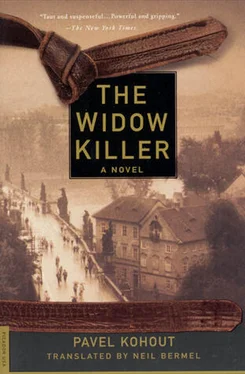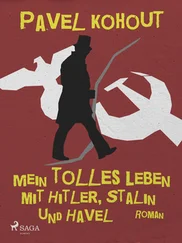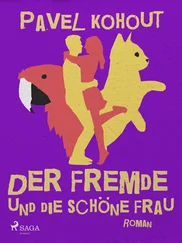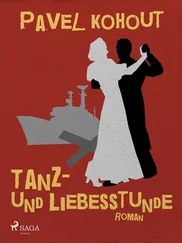“I know,” she said.
“Well, then.”
He felt the emptiness begin to open inside him, but kept his face and voice expressionless, so as not to evoke her sympathy. But why? Why not admit that without her he would be alone with the war, and his life would lose all meaning? Or should he give up this messianic complex of personal guilt and go with her? She was right: he was alone at work; he could issue his own marching orders.
“So you love me,” she said before he could speak again.
“Yes.”
“And you’ll let me leave.”
He steeled himself.
“Yes.”
“Well, that’s good.”
“What?”
“That you love me so much.”
He did not know what to say to this. He felt like he was slowly losing her; every word he said sounded weak or false. This was to be his punishment; could there be a worse one? His nation had visited immeasurable sorrows on the world, and he was sacrificing his personal happiness to redeem them. He wanted to know everything, quickly.
“When will it be?”
“This evening at six, suitcases packed, at the theater. Departure is precisely at seven.”
He looked perplexedly at his watch.
“But it’s eight ”
“I know,” she said. “You see, I love you too. So why should you die here alone?”
Jitka’s funeral took place the morning of Saturday, May fifth. Jan Morava had barely left the dormitory on Konviktská Street when he sensed a new mood in the air. Once again the city’s temper had completely changed. An almost awkward enthusiasm replaced the fear that had gripped it since the February air raids. Most of the German signs had disappeared. The stragglers removing the remaining few did not worry about appearances; they simply crossed out the German words with two strokes of a brush dipped in lime or paint.
This time it was the Czech police closing off the entrance to Bartolom  jská Street. They looked quite exotic. For the first time in years, they wore their black helmets and officers’ belts with pistols and carried rifles. These men were clearly from another district, but they amiably waved him through without checking his documents; they must have known him from occasional contact with his office. Morava had only come in to announce that he intended to continue his search after the funeral, and was surprised when Beran told him that they would go to the cemetery together.
jská Street. They looked quite exotic. For the first time in years, they wore their black helmets and officers’ belts with pistols and carried rifles. These men were clearly from another district, but they amiably waved him through without checking his documents; they must have known him from occasional contact with his office. Morava had only come in to announce that he intended to continue his search after the funeral, and was surprised when Beran told him that they would go to the cemetery together.
“I’ve made the arrangements,” he said. “I’ll just change quickly, and you should put on a uniform too; it’s important we all be seen today. And Morava,” he called after him, “pick up a pistol as well.”
For the first time in two years, since his promotion to assistant detective, he pulled his uniform down from the top shelf of the office wardrobe. The years of disuse showed. When he met the superintendent again they couldn’t help smiling. With training, Morava’s shoulders had grown, and his sleeves barely fit. Beran had lost weight in the bustle of the last few months and his shirt swam on him. Their holsters weighed them down; they kept wanting to cinch them up. The high cap with its badge crimped Morava’s head and settled on Beran’s ears. On top of this they smelled of naphthalene.
“Well, how-dee-doo!” a similarly dressed Litera summed them up. “One look at us and the Germans will pee in their pants and lay down their arms!”
That was his first and last joke for the day. They rode silently through Prague, watching the city painstakingly transform itself from a German metropolis into a Czech one, and trying not to dwell on the reason for their trip. This hysterical rush, Morava mused, was like trying to erase the traces of your own deeds, as if overnight the city could expunge— or at least will itself to forget — six years of meek acceptance too often verging on active collaboration.
The Czech activity had caught the Germans’ attention. Heavily reinforced military patrols were everywhere. Today they walked in threes or fours instead of in twos, and hand grenades with long hafts now jutted from their belts.
“Hey hey!” Litera pointed at a trio they passed underneath the railroad bridge.
The German army had always flaunted its orderliness and discipline in the occupied territories, but the cigarettes stuck in the corners of the soldiers’ mouths were a far cry from that image. For experienced warriors, apparently, Prague was already on the frontlines.
They reached the crown of the steep street alongside the Vy  ehrad ramparts and rumbled across the cobblestones to the church by the cemetery. There Beran surprised Morava for the second time that day.
ehrad ramparts and rumbled across the cobblestones to the church by the cemetery. There Beran surprised Morava for the second time that day.
“I got one for you, too,” he said, while Litera opened the trunk and removed two bouquets and a small wreath.
FOR JITKA FROM JAN — FOR JITKA FROM V. B. — FOR JITKA FROM EVERYONE said the ribbons. Red, white, and blue, they were the colors of the Czech flag, which until now had been strictly forbidden.
“Everyone wanted to come,” the superintendent explained, “but I’ m sure you’ll understand I couldn’t allow that, so I’m here both in a personal capacity and for them.”
Beran had arranged the simple ceremony after a short conversation with Morava on Wednesday. He had unsentimentally ordered that under no circumstances must it run late or exceed fifteen minutes. The police technician removed the decoy tablet with the name JAN MORAVA from the gravesite where the murderer had taken the star-crossed bait, and replaced it with a real one:
JITKA Modrá
The sexton and a vicar from the Evangelical Church of the Savior were waiting at the graveside. Next to them was a simple wooden coffin resting on planks. In a few sentences the vicar said a farewell for her parents and relatives, who were cut off from Prague by the front. Then he read the Lord’s Prayer, and for the first time Morava neither moved his lips nor even said it to himself.
Even now he could only think about the man he was after. How to find him now? Prague was coming to a boil, like a cauldron whose lid dances as the water threatens to spill over. The Czech newspapermen, overcome at the eleventh hour by sympathy for the Resistance, kept sanctimoniously refusing to publish the murderer’s picture. Morava had made a thousand copies of Rypl’s photograph, but only a few policemen in Prague had one, and they were already preoccupied, waiting to see whether the Germans would attack them again, this time more savagely, or whether they themselves would suddenly be forced to attack the Germans. Where could a man hide if he apparently had no relatives or friends here? And who would harbor a strange man at great risk to himself when it could still be a Gestapo trap? Unless… unless.. unless he thought he was hiding Rypl from the Germans!
Yes, if people who had called the Germans valued customers yesterday could turn about and publicly erase all the German signs today, wouldn’t someone who desperately wanted an alibi be tempted to hide a supposed… what? Maybe a persecuted patriot? But then it could be a whole family covering for him, or a whole building. Rypl wouldn’t even have to set foot outside.
In that case, the key character was this Malina. The murderer had almost certainly left the train station with him. Why should they accept the neighbor’s statement that he went to visit his mother and that there was no one in the apartment? No, he’d have it opened today on orders. .. He almost turned to Litera so as to be off without delay, when a movement disrupted his thoughts.
Four men in well-worn dark clothes skillfully tightened and then loosened the straps. The coffin began to descend into the grave he had designed himself and adorned with his own name, only to place his wife and unborn child into it. Just at that moment Jitka seemed to be physically present by him; he could see the shyness of her brown eyes beneath their lids, smell the country milkiness of her skin, feel her fingers, knuckles, elbows, sides, breasts.
Читать дальше

 jská Street. They looked quite exotic. For the first time in years, they wore their black helmets and officers’ belts with pistols and carried rifles. These men were clearly from another district, but they amiably waved him through without checking his documents; they must have known him from occasional contact with his office. Morava had only come in to announce that he intended to continue his search after the funeral, and was surprised when Beran told him that they would go to the cemetery together.
jská Street. They looked quite exotic. For the first time in years, they wore their black helmets and officers’ belts with pistols and carried rifles. These men were clearly from another district, but they amiably waved him through without checking his documents; they must have known him from occasional contact with his office. Morava had only come in to announce that he intended to continue his search after the funeral, and was surprised when Beran told him that they would go to the cemetery together. ehrad ramparts and rumbled across the cobblestones to the church by the cemetery. There Beran surprised Morava for the second time that day.
ehrad ramparts and rumbled across the cobblestones to the church by the cemetery. There Beran surprised Morava for the second time that day.










